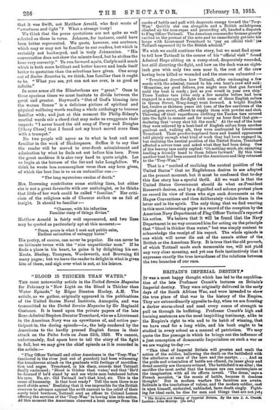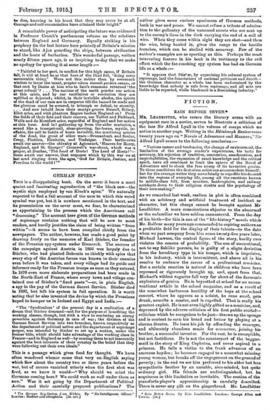BRITAIN'S IMPERIAL DESTINY.*
IT was s most happy thought which has led to the republica- tion of the late Professor Crumb's lectures on Britain's Imperial destiny. They were originally delivered in the early days of the South African War, and were intended to show the true place of that war in the history of the Empire. They are extraordinarily apposite to-day, when we are fronting a darker storm-cloud and need every ounce of strength to pull us through its buffeting. Professor Cramb's high and burning sentences are the most inspiriting testimony, alike to the Empire's right to win and to its habit of winning, that we have read for a long while, and his book ought to be studied in every school as a manual of patriotism. We may quote the fine passage in which he brings out the influence of a just conception of democratic Imperialism on such a war as we are waging to-day • ' This ideal of Imperial Britain will greaten and exalt the notion of the soldier, hallowing the death on the battlefield with the attributes at once of the hero and the martyr.. . . And as the pride and ostentation of battle are effaced, ire inner glory and dread sanctity are the more evinced. The battlefield is an altar ; the sacrifice the most awful that the human eye can contemplate or the imagination with all its efforts invent, 'The drum,' says a French moralist, • is the music of battle, because it deadens thought' But in modern warfare the faculties are awake. Solitude is the touchstone of valour, and the modern soldier, coat in upon himself, undazzled, nnblinded, faces death singly. Fight- ing for ideal ends, he dies for men and things that are not yeti • Th. Origin. and DMiny ef neesriet Britain. By the late J. A. Crarab, London: John Murray. [5a. mt.]
be dies, knowing in his heart that they may never be at all Courage and self-renunciation have attained their height.'
A remarkable power of anticipating the future was evidenced in Professor Oramb's posthumous volume on the relations between England and Germany. Eqnally striking is his prophecy (in the last lecture here printed) of Britain's mission to stand, like Ajax guarding the ships, between civilization and the hosts of barbarism. This wonderful passage, written nearly fifteen years ago, is so inspiring to-day that we make no apology for quoting it at some length r- " Faithful to her past, in conflict for this high canoe, if Britain fall, it will at least be as that hero of the Iliad fell, •doing some memorable thing.' Were not this nobler than by overmuch wisdom to incur the taunt, propter viten; Matadi 'mien CAM.; or that cast by Dante at him who to fate's enremons returned 'the great refusal 'P . . The satin's of the earth ponder our action at this crisis, and by our vacillation or resolution they are uplifted or dejected; whilst, in their invisible abodes, the spirits of the dead of oar race are in suspense till the hazard be made and the glorious mead be secured, in triumph or defeat, to eternity. . And now behold from their martyr graves Russell, Sidney, Eliot arise, and with phantom fingers beckon England on ! From the fields of their fate and their renown, see Talbot and Falkland, Wolfe and de Montfort arise, regardful of England and her action at this hour. And lo! gathering up from the elder centuries, a sound late a trumpet-call, clear-piercing, far-borne, mystic, in- effable, the call to battle of hosts invisible, the mustering armies of the dead, the great of other warn—Brunenburh and Sonia% Crecy, Flodden, Blenheim, and Trafalgar. Their battle-cries await our answer—the chivalry at Agincourt, 'Heaven for Harry, England, and St. George!' Cromwell's war-shout, which was a prayer, at Dunbar, 'The Lord of Hosts! The Lord of Hostel'— these await our answer, that response which by this war we at last send ringing down the ages, • God for Britain, Justice, and Freedom to the world!"







































 Previous page
Previous page